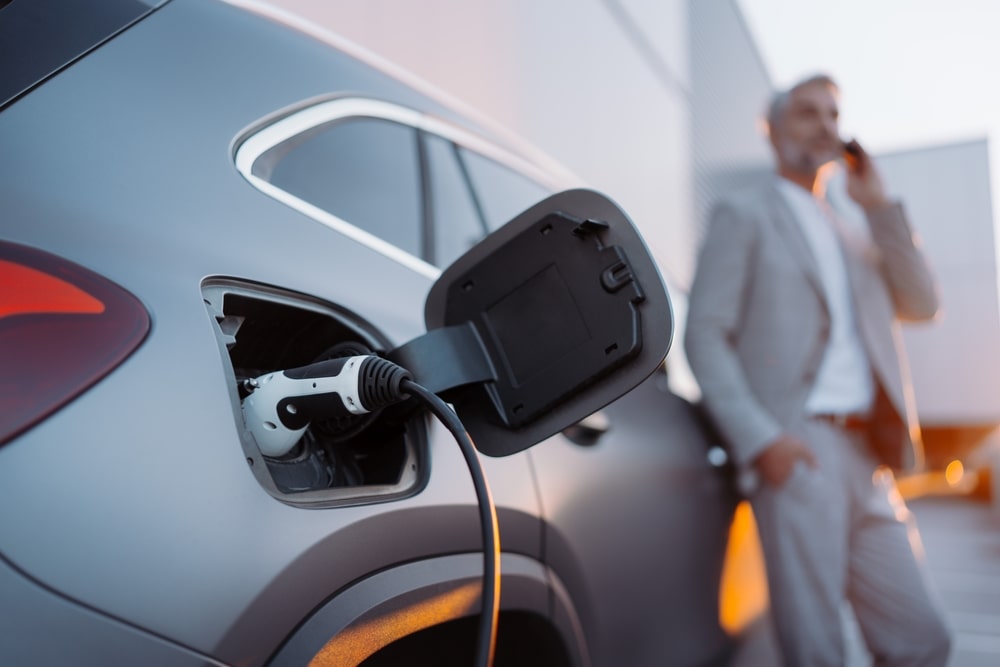
Last updated on April 21, 2023
EV charging can be a lucrative investment for your business, and charging fees can bring in thousands in revenue per year, depending on your situation and type of business.
This article will break down different charging fee strategies, and includes a table of gross monthly revenue estimates based on a variety of situations and locations that include (and combine) AC and/or DC charging stations, by looking at multiple common EV charging behaviours.
Click here if you want to drop down the revenue estimate table immediately.
Beyond direct revenue, EV charging stations can also help attract new customers by putting your business on the map, increase the time they spend at your location, unlock cross-selling opportunities, and enhance your sustainability credentials.
Electric car charging stations business opportunity
Installing EV charging stations today is about more than just preparing your location for this shift in transportation—it’s also a clearcut path to attracting more customers and generating more profit. Below are a few examples of how adding public EV charging can make your existing business more profitable, as well as become a revenue stream all on its own.
How to increase customer spend with EV charging
In today’s competitive landscape, businesses must think of creative ways to attract customers while also boosting the value of each transaction. Transforming your location into an EV charging destination is one of the simplest ways to do just that.

Increase the average duration of each customer interaction
Once EV drivers stop to charge, there is an obvious cross-selling opportunity for add-on products and services. Whether it’s a ride-share driver recharging during a lunch break or a youth team coach topping off his battery while getting snacks for the team.
EV drivers will be more willing to visit and spend time at your location if you offer EV charging.
Depending on the type of charger you choose, EV's can take anywhere from a few minutes to a couple of hours to charge (depending on battery size). For shops, restaurants, or petrol stations, a fast (DC) charging solution is an ideal choice, charging even the largest EV batteries in under an hour.
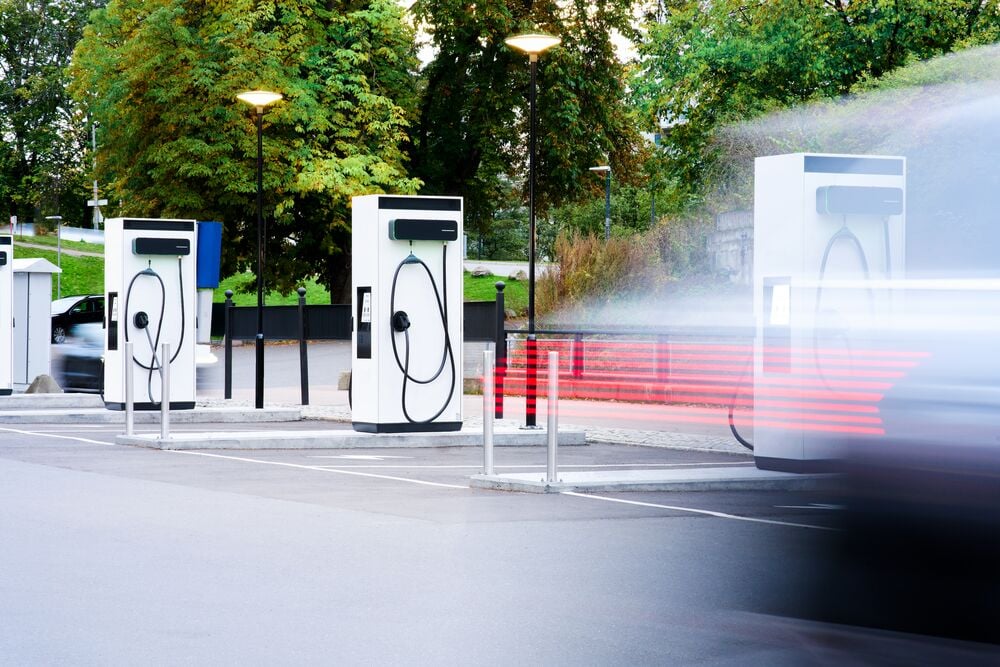
However, since most EV's coming to your location aren’t looking to charge from 0-100 per cent, a standard Level 2 (AC) charging solution can also suit most driver needs, allowing them to add ~25 miles of range per hour. In many cases, a mix of AC and DC charging stations is the best solution.
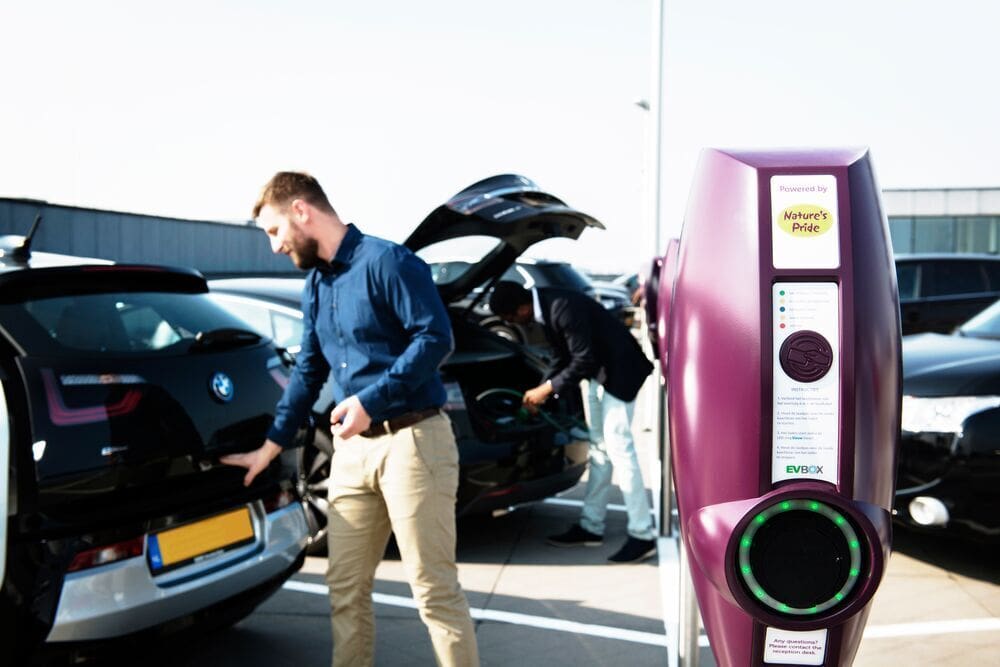
Either way, by offering your customers a convenient charging experience, you also encourage them to spend time and money at your location while they wait.
How to attract customers with EV charging stations
Our research, in partnership with Ipsos, found that EV drivers are more educated, wealthier, and younger than the average population. With more disposable income than petrol-car drivers, your EV-driving customers will not only spend more time at your location but also purchase higher-end goods and services every time they visit. Plus, these drivers are likely to turn into loyal, repeat customers once they know your business offers this valuable service.

According to the EY Mobility Consumer Index, 52 per cent of car buyers are considering an EV for their next purchase. As a consequence, locking in your location now as one of the places that provide EV charging could turn your business into an often-frequented EV charging destination.
How to improve business reputation with EV charging stations
EV charging stations also put your business on the map—literally. Popular navigation sites like Google Maps or Waze, and dedicated charging apps such as PlugShare feature interactive maps that enable drivers to locate nearby public charging stations. By having charging stations at your site, you can boost your brand visibility on these platforms and attract new customers.
Plus, with customised charging stations that display your brand colours or logo, you can drastically improve your corporate image by letting everyone who sees them know that your organisation is openly committed to a more sustainable future.
Environmental concerns are increasingly top-of-mind for your customers. By having charging stations on your property, you can establish your business as an eco-conscious organisation—and even earn some prestigious sustainability certifications for your location (LEED, GBB, WELL).
Generate EV charging station revenue
Attracting new customers, earning brand loyalty, and increasing the time (and money) spent at your location are all excellent examples of how EV charging can drive profitability. But the most obvious way EV charging can boost profits is the revenue earned from the stations themselves. Depending on the business model you choose, you can generate additional income by setting charging fees, and your customers will be more than happy to pay them.
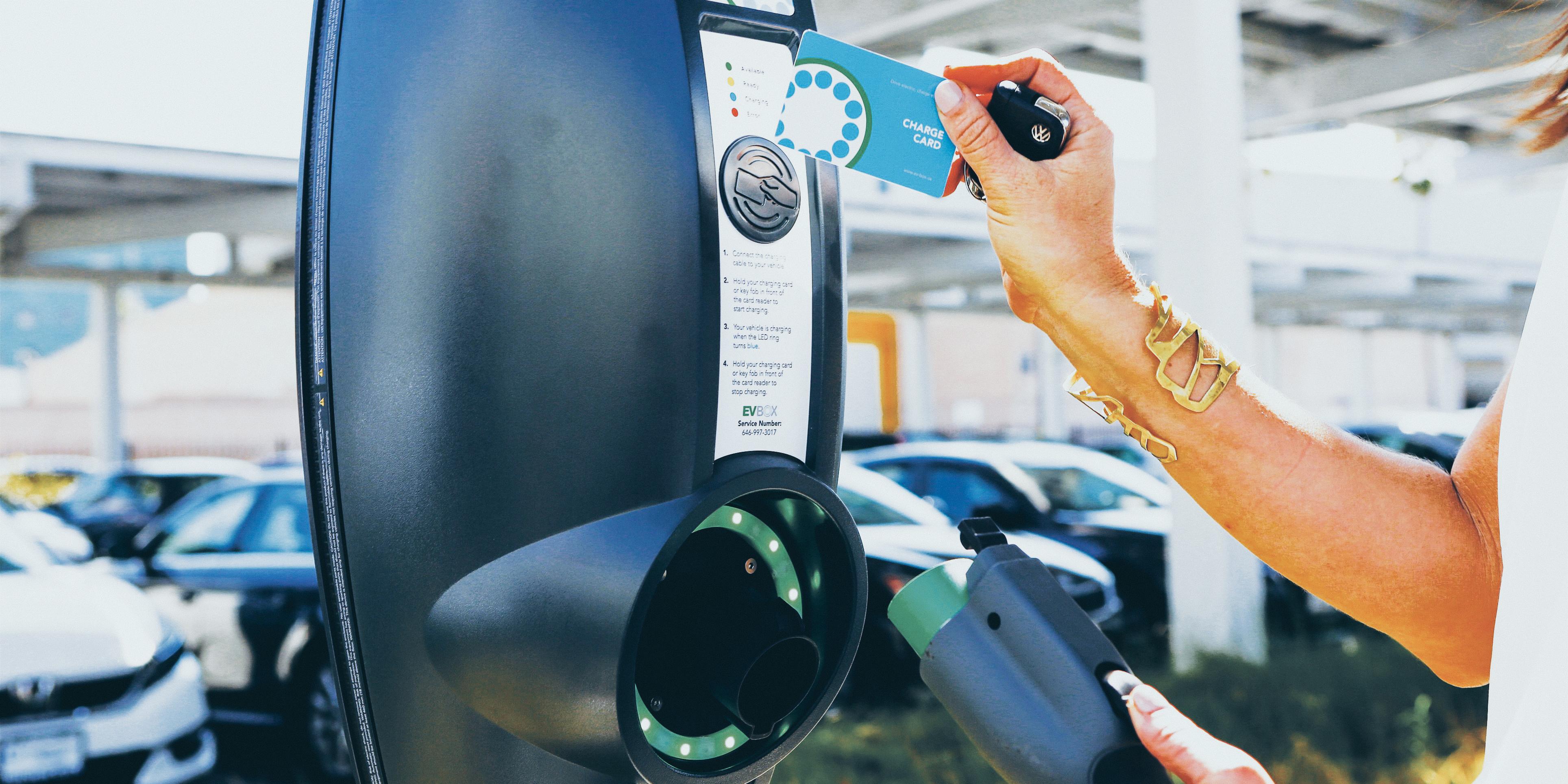
Are EV charging stations profitable?
Yes, they can definitely be profitable. EV charging is a service drivers are willing to pay for, especially if it is fast charging. Of course, how profitable it is, depends on the specifics of your situation, location, and business.

There are a few primary ways you can structure pricing on your charging stations—it really depends on what you want to get out of your setup. You can also test out different strategies to find which works best for you. By having an overview of your stations’ pricing and energy usage via your charging management platform, making adjustments to your setup is as easy as updating a few settings.
Earn money by setting charging fees for your customers and visitors
Before you can start earning revenue from your charging stations, the first thing you need to figure out is how you want to bill for charging. As the charging station owner, you can set your own charging fees and adjust them at any time. This may include a fixed session start or connection fee and a variable rate for the energy used.
EV charging fees based on energy consumption
One common practice is to simply charge the cost of energy being used (i.e., £0.30/kWh). You also have the freedom to define your own markup (i.e., £0.30/kWh). So, if a car pulls up and needs to charge 25 kWh, that’d be:
25 kWh x £0.60/kWh = £15.
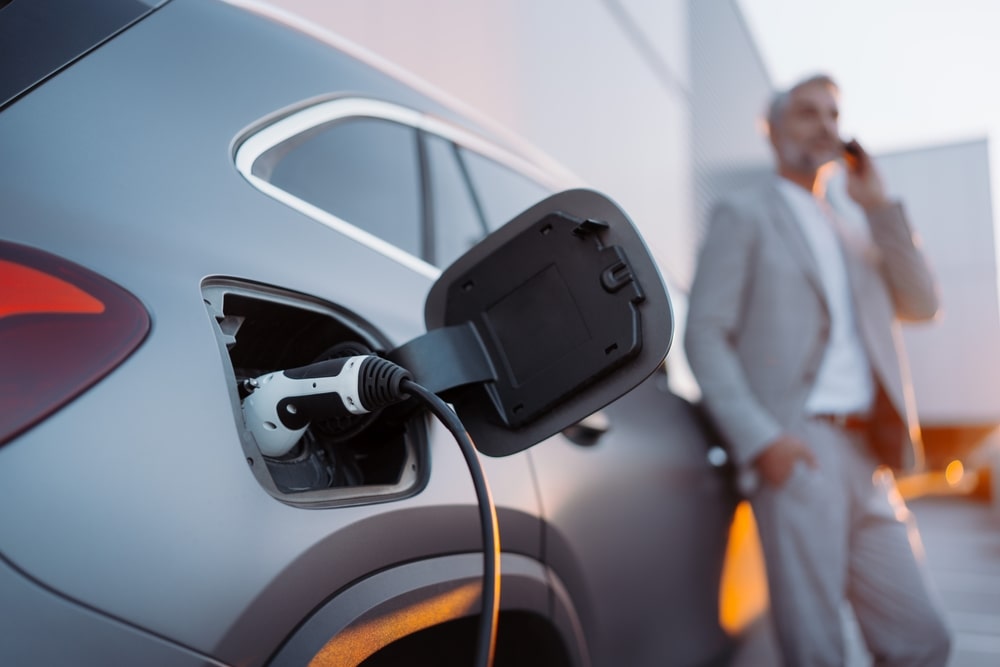
EV charging fees based on time
If you’d rather set a fee based on time, you can implement a flat hourly rate (i.e., £2.16/hour). So, if the station is charging at 7.4 kW, and the car needs 25 kWh to recharge:
25 kWh / 7.4 kW = ~3.5 hours.
From there, just multiply the time plugged in by your hourly rate to get the estimated revenue:
~3.5 hours x £2.16/hour = ~£7.56 total.
Combined EV charging fees
Some sites combine the two forms of charging. For example £0.45/kWh + £0.30/hour. This helps to reduce their hourly rate while still ensuring guests don’t “camp out” in a spot when their car is fully recharged.
EV charging fees for fast charging
It’s important to note that consumers expect different energy prices depending on the type of charging your stations offer. Commercial AC charging tends to be cheaper and can take around four to six hours to fully charge a vehicle, depending on the model. DC charging prices are typically higher, as fast charging allows drivers to spend less time plugged in (usually between 15 minutes to an hour).
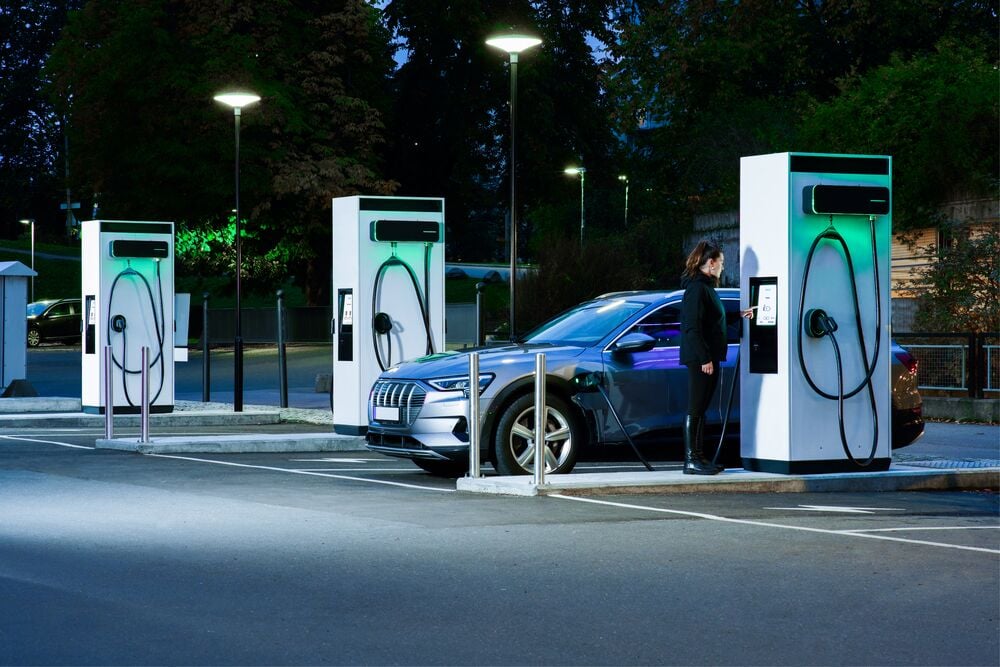
The amount of revenue you can earn also depends on your location type and how often your stations are utilised. At hotels, for example, guests typically park for eight to 12 hours overnight while they sleep. In this scenario, AC charging stations would be the ideal investment.

At motorway service areas or petrol stations, on the other hand, customers usually park for 15-30 minutes while grabbing a snack or coffee. In this scenario, DC fast-charging stations would be more suited, with a quick enough turnaround time to allow all your customers to charge quickly and get back on the road.

EV charging station revenue overview
To give you a ballpark idea of how much monthly revenue you can make from offering EV charging, here’s a breakdown of some common scenarios and the estimated revenue of different charging scenarios.
If you want to get an idea of how much revenue you can make at your location, Download our free EV charging revenue calculator (no email required).
| How much revenue can you earn from EV charging per month?** |
|||||
| Your visitors are looking for charging |
During a coffee break |
On a short shopping visit |
While eating a meal |
During part-day parking |
During the day or overnight |
| Estimated parking/ |
15-30 mins |
0.5-2 hours |
0.5-2 hours |
4 hours |
8-12 hours |
| EV Infrastructure |
2 DC chargers |
2 DC chargers |
4 AC chargers |
20 AC chargers |
8 AC chargers |
| Estimated gross revenue from EV charging per month** |
|||||
| Standard location with lower utilisation |
£2,640*** | £3,000*** |
£1,680*** |
£6,300**** |
£4,200***** |
| Daily station usage per charger |
DC: 4X |
DC: 1 |
DC: N/A |
DC: N/A |
DC: N/A |
| Popular location with higher utilisation |
£10,560*** |
£6,000*** |
£3,360*** |
£12,600**** |
N/A |
| Daily station usage per charger |
DC: 8X |
DC: 2X |
DC: N/A |
DC: N/A |
Due to longer charging times, stations are not used more than once per day |
*Actual infrastructure varies depending on the site // ** Excluding any operator fees applicable. This table is only an example and may not reflect actual gross revenue earned at a specific location. // ***Calculations are based on the assumption that the DC kWh consumption will be 40 kWh with each charging session at a cost of £0.55 per kWh, AC 20 kWh consumption with each charging session at a cost of £0.35 per kWh // ****Calculations are based on the assumption that the AC kWh consumption of 30 kWh per charging session at a cost of £0.35 per kWh // *****Calculations are based on the assumption that the AC kWh consumption of 50 kWh per charging session at a cost of £0.35/kWh. |
|||||
You can also set different charging rates for various customer groups. For example, you could use a stratified approach where some guests pay less than others (i.e., discounted EV charging for rewards members). If you’re interested, you can take a look at some of the most common business models used at locations like yours.
EV charging to grow your business
From cross-selling opportunities to generating its own revenue, EV charging is a great way to bring in some new business—and it’s only going to get bigger.
If you’re considering installing EV chargers at your business, our latest commercial EV charging solutions offer easy ways to scale up monetisation and allow you to stay in complete control with its connected and smart charging features.
Related articles

How to install EV chargers at the workplace?
Regardless of the type or model of charger you choose (or how much one costs), installing EV charging stations is...
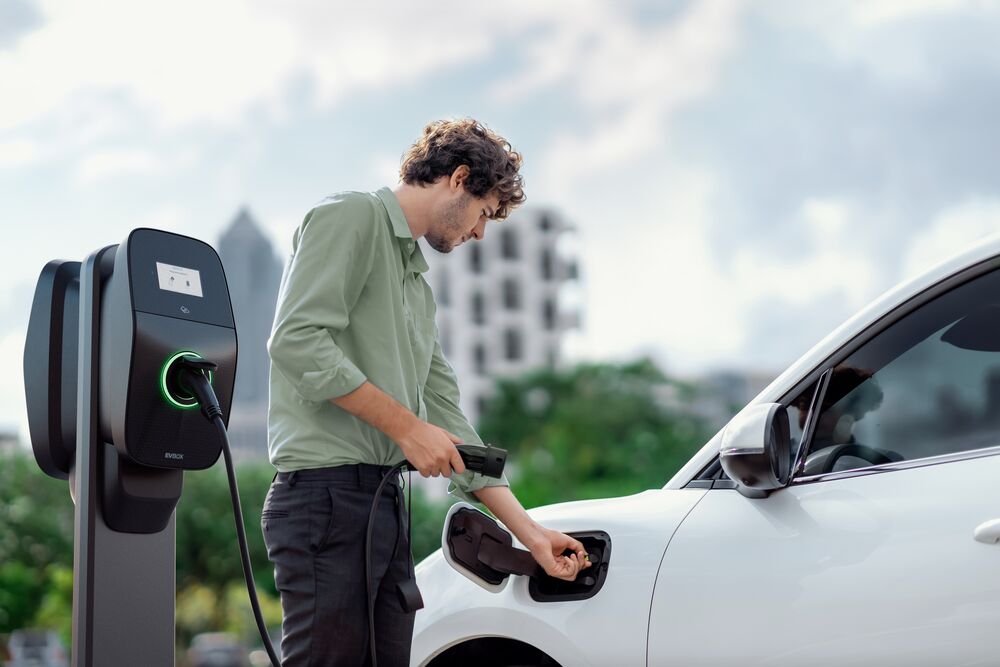
What do workplace EV chargers cost?
On average, AC workplace EV chargers tend to cost around £1,100 per charge port (excluding installation costs)....
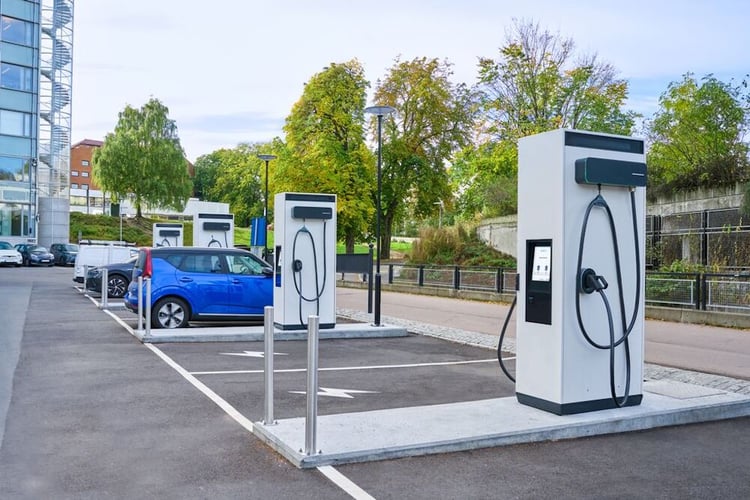
How to prepare your workplace for installing EV chargers
Installing EV charging stations at your workplace is a significant investment, so it’s important to consider the...
